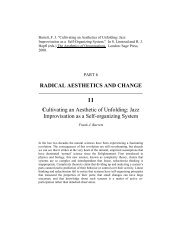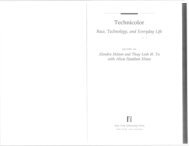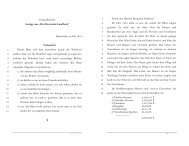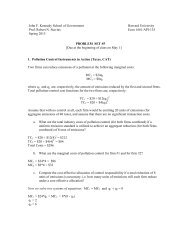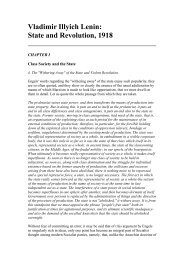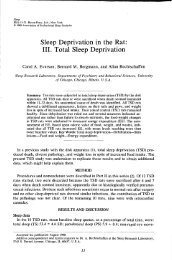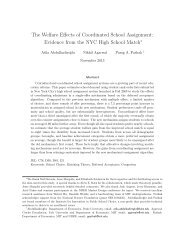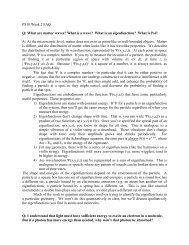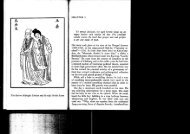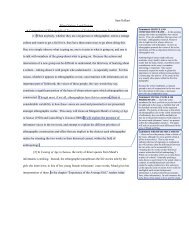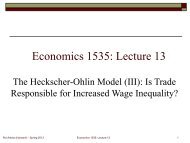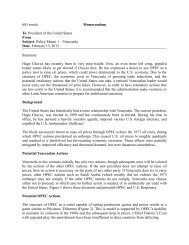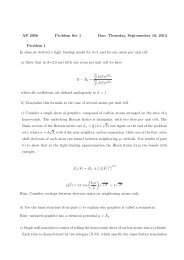CUisis AuthoU(s): ReinhaUt Koselleck and Michaela W ... - iSites
CUisis AuthoU(s): ReinhaUt Koselleck and Michaela W ... - iSites
CUisis AuthoU(s): ReinhaUt Koselleck and Michaela W ... - iSites
Create successful ePaper yourself
Turn your PDF publications into a flip-book with our unique Google optimized e-Paper software.
<strong>Koselleck</strong> + Crisis<br />
spectives, a crisis either reveals a situation that may be unique but could<br />
also-as in the process of an illness-continue to recur. Or, analogous to<br />
the Last Judgment, a crisis is interpreted as involving a decision which,<br />
while unique, is above all final. Thereafter, everything will be different.<br />
Between these two extremes there may be a cornucopia of variants which,<br />
although logically exclusive, can influence the characterization of crisis<br />
both as entailing a possible structural recurrence <strong>and</strong> as absolutely unique.<br />
In this way, the concept of crisis can generalize the modern experience<br />
to such an extent that "crisis" becomes a permanent concept of "history."<br />
This appears for the first time with Schiller's dictum: "Die Weltgeschichte<br />
ist das Weltgericht" ("World History is the Last Judgment"),ss the impact<br />
of which cannot be overestimated. Without actually taking over the term<br />
"Last Judgment," Schiller nonetheless interprets all of human history as a<br />
single crisis that is constantly <strong>and</strong> permanently taking place. The final judg-<br />
ment will not be pronounced from without, either by God or by historians<br />
in ex post facto pronouncements about history. Rather, it will be executed<br />
through all the actions <strong>and</strong> omissions of mankind. What was left undone<br />
in one minute, eternity will not retrieve. The concept of crisis has become<br />
the fundamental mode of interpreting historical time.<br />
Another variant lies in the repeated application of a crisis concept that<br />
represents at the same time-like the ascending line of progress-a histori-<br />
cally unique transition phase. It then coagulates into an epochal concept in<br />
that it indicates a critical transition period after which-if not everything,<br />
then much-will be different. The use of "crisis" as an epochal concept<br />
pointing to an exceptionally rare, if not unique, transition period, has ex-<br />
p<strong>and</strong>ed most dramatically since the last third of the eighteenth century,<br />
irrespective of the partisan camp using it.<br />
As it pertains to historical time, then, the semantics of the crisis concept<br />
contains four interpretative possibilities. 1) Following the medical-political-<br />
military use, "crisis" can mean that chain of events leading to a culminat-<br />
ing, decisive point at which action is required. 2) In line with the theological<br />
promise of a future Last Day, "crisis" may be defined as a unique <strong>and</strong> final<br />
point, after which the quality of history will be changed forever. 3) Some-<br />
-" Friedrich Schiller, "Resignation. Eine Phantasie" (178/84), Simtliche Werke (Stuttgart<br />
<strong>and</strong> Berlin, 1904), vol.1, 199; also Schiller, Geschichte, Sdmtliche Werke, vol. 2, 667ff.<br />
For an early evidence of "crisis" as a permanent category of history, albeit with progressive<br />
overtones, see Justus Moser, "Patriotische Phantasien" (1778), Simtliche Werke, vol.<br />
6 (1943), 81; to make a people great, it must be kept active <strong>and</strong> "kept in such permanent<br />
crisis . . . as will make it necessary to draw on all its powers <strong>and</strong> through the use of the<br />
same to increase the sum of the good of the world."<br />
371



